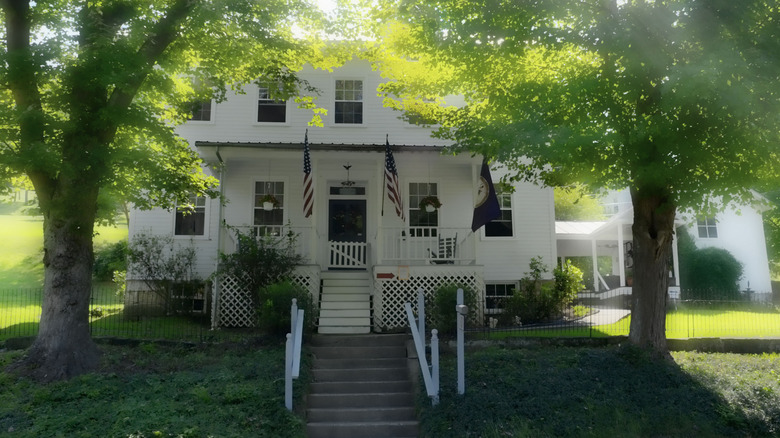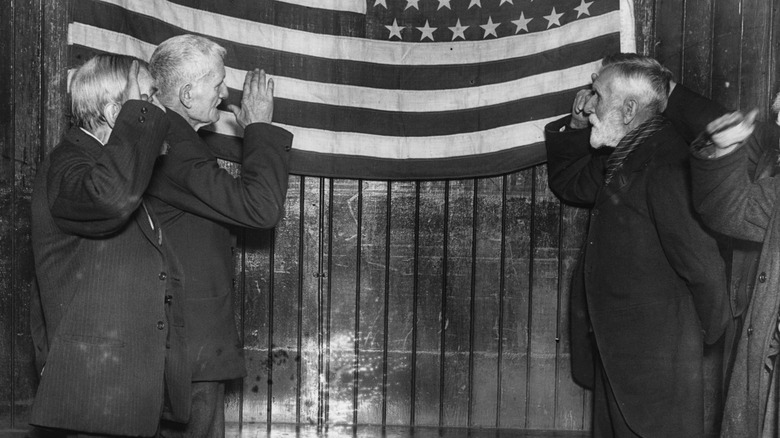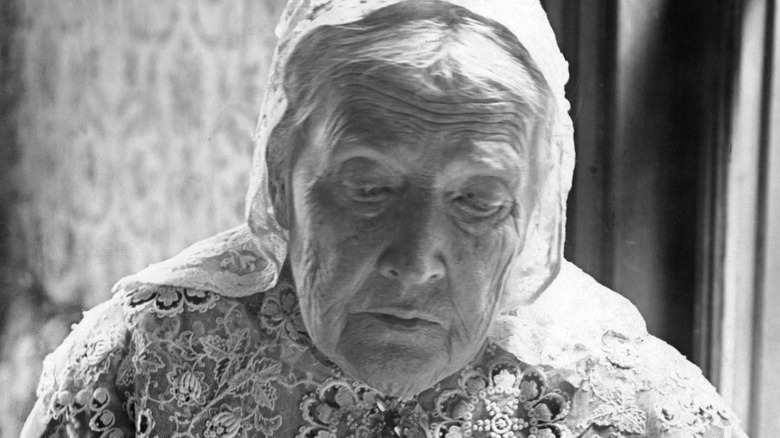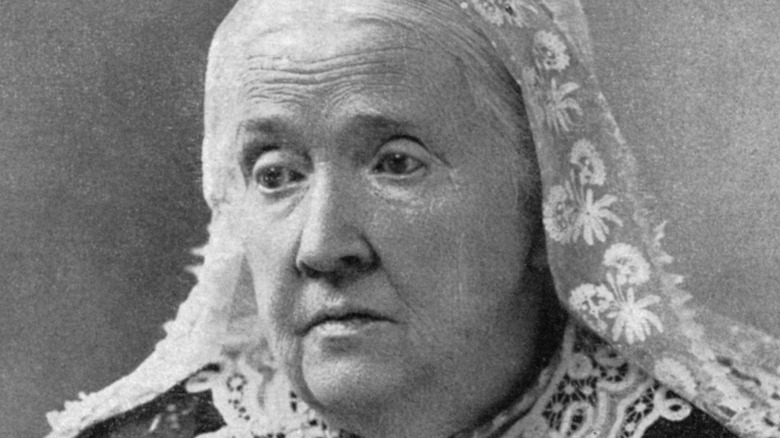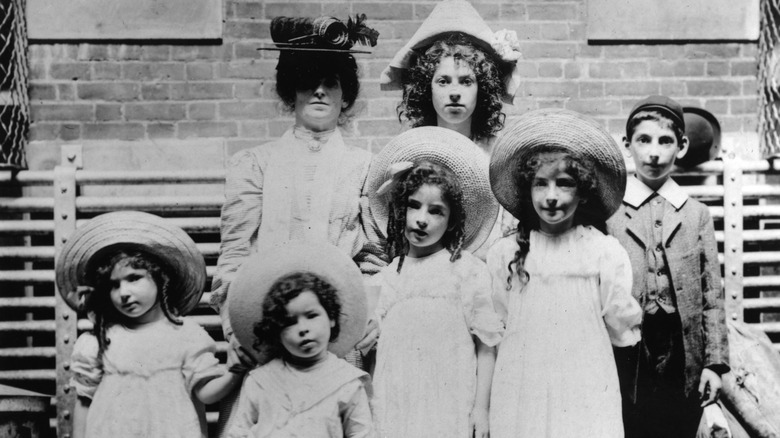The History Of Mother's Day In The US Is Much Different Than You'd Imagine
Observed on the second Sunday of May each year in the U.S., Mother's Day is a time to reach out, pause, and reflect on the important role mothers play in our lives. First set aside as a national holiday in 1914 by President Woodrow Wilson and now celebrated all over the world, American Mother's Day has a far different history, though, than the brunches, flowers, and cards we now typically think of, as Office Holidays explains.
The story of Mother's Day, in fact, begins with one of America's deadliest conflicts, and several important social movements played a part in its history. The effects of many such movements are still felt today. All that being said, Mother's Day didn't come from just one place. Although President Wilson signed the proclamation, without the hard work and dedication of several women, many of them working independently, Mother's Day might have never been realized, according to History.
Anna Jarvis and the first American Mother's Day
The modern American Mother's Day came about in no small part to the efforts of Anna Jarvis, who lived in the late 19th and early 20th century, as Today explains. (Anna Jarvis' home in Grafton, West Virginia is pictured above.) Jarvis' objective was to honor her own mother, Ann Reeves Jarvis, who herself was an important figure in the holiday's history. With financial backing, Jarvis' first Mother's Day was an unbridled success in Philadelphia.
From there, Jarvis worked tirelessly to make Mother's Day a national holiday, and by 1912, many states, churches, and towns followed her lead, as History explains. Jarvis, at that point, had even set up the Mother's Day International Association to help further her cause. By 1914, Jarvis' dreams had been realized and a national Mother's Day holiday was a reality. Who was Jarvis' mother Ann Reeves Jarvis, and what role did she play in the history of Mother's Day?
Juliet Calhoun Blakely, Mary Towles Sasseen, and Frank Hering
Anna Jarvis and her mother, Ann Reeves Jarvis, aren't the only important names in the story of how modern Mother's Day came about in America. Juliet Calhoun Blakely, Mary Towles Sasseen, and Frank Hering, who were all temperance advocates and anti-war activists, brought about Mother's Day-like celebration in the 19th century, each in their own way, and some a half-century prior to Jarvis. Herring, a man, is known as the "Father of Mother's Day," according to History.
Blakely, for her part, organized something very similar Mother's Day celebrations in Albion, Michigan, in the 1870s, and Mary Towles Sasseen and Frank Hering put in their own work around that same with "Mother's Day for Peace" observances in Boston, which lasted 10 years (via USA Mothers Day) What partially motivated all of them was to make sure that something like the American Civil War never happened again. Each one of these figures was likely inspired by both Anna Reeves Jarvis, and the next pivotal player in Mother's Day history, the abolitionist and suffragette Julia Ward Howe, who wrote the "Mother's Day Proclamation," the foundational text of the holiday.
Julia Ward Howe
In addition to writing the "Mother's Day Proclamation," Julia Ward Howe (above) played an important part in Mother's Day history — which she called "Mother's Peace Day" — in one other way as well, according to Plough. Howe, who also penned the poem "Battle Hymn of the Republic," sought to heal the deep wounds of the Civil War with "Mother's Day for Peace," 1870s-era anti-war rallies in New York, which Sasseen and Hering also organized in Boston around that same time, as USA Mothers Day explains.
Howe was also the co-founder of the "American Woman Suffrage Association," per Womens History. This, along with several key players in the early history of Mother's Day, show that Howe's motivations were not only to honor the hard work and important role women and mother's play in all our lives, but to call for peace, women's suffrage, and temperance. These objectives and values showed up in Howe's "Mother's Day Proclamation," which she wrote in 1870.
The 'Mother's Day Proclamation'
The pacifist values of early Mother's Day founders show up in several instances in the text of the "Mother's Day Proclamation." Calling for peace, Howe wrote, "We women of one country will be too tender of those of another country to allow our sons to be trained to injure theirs. From the bosom of the devastated earth a voice goes up with our own. It says, 'Disarm, disarm! The sword is not the balance of justice'" (via Plough).
And for the suffragist cause, Howe added, "In the name of womanhood and of humanity, I earnestly ask that a general congress of women without limit of nationality may be appointed and held at some place deemed most convenient and at the earliest period consistent with its objects." And in one of the most cutting passages, she went on, "We will not have great questions decided by irrelevant agencies, our husbands shall not come to us, reeking with carnage, for caresses and applause" (per Plough). Howe may not, however, have ever written those words without perhaps the most pivotal figure of all in American Mother's Day history: Ann Reeves Jarvis, Anna Jarvis' mother.
'Mothers' Day Work Clubs' and 'Mothers' Friendship Day'
None of the aforementioned hard work may have ever taken place if it weren't for the Mothers' Day Work Clubs and Mothers' Friendship Day, organized by Anne Reeves Jarvis in the years leading up to and following the American Civil War. Each one of these events had very similar objectives to what motivated Julia Ward Howe to write the "Mother's Day Proclamation" some decades later. "Mother's Day Work Clubs" were effectively parenting classes organized by Howe to offer support and information for new mothers. The "Mothers' Friendship Day" was explicitly meant to heal divisions left over between the North and the South from the Civil War, according to History.
What's for certain, without either one, Anna Jarvis would not have worked so tirelessly to make Mother's Day a national holiday in the early years of the 20th century. Sadly, not long after Mother's Day was established as a national holiday, Jarvis felt it became too commercial, losing much of the ethos that inspired it early on. By the 1920s, in fact, Jarvis renounced the holiday, and by the 1940s she abandoned it entirely, calling for it no longer to be considered a holiday at all, via History.

